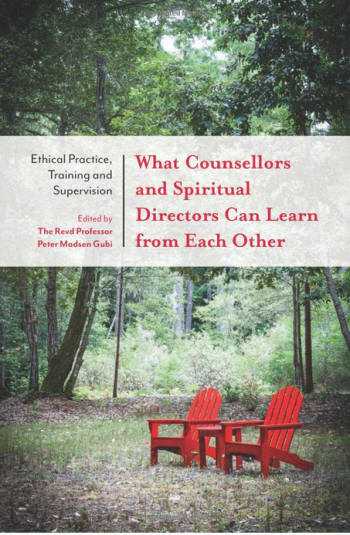Book Review
What Counsellors and Spiritual Directors Can Learn fom Each Other
Peter Madsen Gubi (Editor)
Jessica Kingsley Publishers (21 April
2017)
ISBN: 978-1785920257
 This
book is a great help in our understanding of the intersection between
counselling and spiritual direction. It reminds us that spirituality is at
the very heart of our work in health care.
This
book is a great help in our understanding of the intersection between
counselling and spiritual direction. It reminds us that spirituality is at
the very heart of our work in health care.
I remain of the opinion that while there is bound to be a certain overlap, spiritual direction and counselling are quite different disciplines. Spiritual direction is about our relationship with God firstly and foremost while counselling is to do with ourselves and our relationship with others. In the chapter by Lynette Harborne, we learn that the process of discernment in spiritual direction is really prayer about our prayer. What then is prayer? The Ignatian definition is of great help: prayer is finding God in all things. Through prayer, we discern what God wills for us in our individual circumstances. It is noted that the core of the Spiritual Exercises of Ignatius is the removal of obstacles that impede our love of God and our seeking and doing His will. So, discernment is more than making choices: it is about choosing what comes from God and what does not.
Will doing the will of God always bring about happiness? No, God's timing may be different from ours. Nevertheless, there is consolation and desolation in the spiritual life. Consolation moves us closer to God because we are doing His will. Desolation is when we sense we are away from God. We need discernment of spirits to determine what comes from God and what does not.
For Ignatius, when seeking discernment, it is best to start from a position of indifference. The author well explains that this does not mean not caring. It means being ready to do what is perhaps difficult. It is about doing the will of God no matter what the cost.
The chapter by Peter Madsen Gubi helped me to understand the very real difference between counselling and spiritual direction. I was left asking at least two questions. Ought we pray for our patients? Certainly. Ought we pray with our patients? Only when the circumstances are entirely appropriate. I was also left reflecting on those occasions in the past when seeking spiritual direction, individuals only encounter efforts at counselling or psychotherapy. Much of what is offered these days such as the Enneagram and Myers Briggs Test have little to do with authentic Catholic spirituality.
R. Jane Williams writes that "among the many contemplative practices we teach...are silence, mindfulness, sitting meditation, walking meditation, centering prayer, Lectio Divina...yoga, Tai Chi and mandala drawing." Only some of these practices can be used in Catholic spirituality. Mindfulness is not compatible with Catholic spirituality. Nor are yoga or Tai Chi.
The chapter on spirituality and sexual abuse had a good section on false memory syndrome. In the chapter on trauma and spiritual growth, it was good to read that "spirituality is very important in the ways in which people cope with trauma and acute stress."
All in all, I was very glad to have read this book. I disagree on some points. However, there is much to wholeheartedly agree with.
Reviewed by Dr Pravin Thevathasan
